
To a neophyte, skateboarding is a risk-taking activity many steer clear of. Whether it be the constant bruises or fractured bones caused by joyrides, skaters are accustomed to achieving velocity for a trick that feels impossible. It is a lifestyle built from paved streets that many practice to feel visible and skating is a sport many love.
However, as pariahs unified to go against the grain, these individuals are often most comfortable in their niche communities which they sustain for themselves. Many skaters who grew up exploring the adventure of skateboarding with their childhood friends have formed influential careers within the hyper-cultural zeitgeist of streetwear, music, and the arts.
Skating requires a lot of skill and hundreds of hours of practice, but it has become an Olympic event first acknowledged at the 2020 Tokyo Olympics. Skating used to be a subculture, but now, the global recognition of the pastime has given many novice skaters pushing their boards on the pavement a horizon to reach.

In the early aughts, innovative Black artists took over the skateboard scene with their creative contributions to the blog era. Pharrell Williams, formerly known as Skateboard P, developed N*E*R*D and then the popular skateboard brands Billionaire Boys Club & Ice Cream and BAPE. Shortly after, the Los Angeles-based misfit collective OddFuture (Tyler the Creator, Earl Sweatshirt, Syd) ushered in a new, younger wave of skaters who were more crude and authentically themselves — take it or leave it. Skating has been the confidence-building vehicle that has spawned some of today’s most empowering voices in music and fashion.
“I work so hard to travel all over the world to bring skateboarding to so many people,” LA skater Briana King tells me. After being bullied out of committing to skating several times, King was saved by a tight-knit group of fellow Black skaters who would adopt her into their community. “So many people are interested and are a bit nervous to start skateboarding, so the Olympics sheddding light on skateboarding will make things much more comforting for people to join,” she says.
King has been a strong voice and advocate for supporting unhoused skaters by getting them into safer communities and environments where they can thrive. She has donated over 1,000 boards to skaters worldwide: “Skateboarding is there for everybody, and we will always be the oddballs. It’s so cool that it will always attract the oddest people, and we all come together to be weird together.”

Photo Courtesy: Briana King Instagram
In 2013, Ishod Wair competed in the Super Crown World Championships and placed third overall. Since then, he has been seen as a major force in street skateboarding and was the first African American to win Thrasher Magazine’s Skater Of The Year award. The New Jersey native and pro-skateboarder thanks skating for saving him. “The Black community really loves skating,” he says. “I felt maybe 15 or 20 years ago it was much different, but we love this shit, man, and people are willing to kill themselves over skating.”
Skating culture has evolved significantly, with music and fashion playing pivotal roles in its expansion and mainstream appeal. The influence of hip-hop, punk rock, and electronic music has helped to shape the rebellious and creative spirit of the skating community, making it more inclusive and diverse. Streetwear brands and collaborations with high-end fashion labels have brought skating aesthetics into the mainstream, further legitimizing the culture.
As a result, younger generations are finding new ways to express themselves through skating, merging it with their unique styles and musical tastes. This fusion of music, fashion, and skating is creating a vibrant, evolving culture that continues to resonate with and inspire the next generation. Fashion and musical creatives Dashawn Jordan and Mateo Berry both started skating in middle school. Jordan started competing full-time young and earned endorsements from Nike and more. He is a musician who still skates and co-owns a skating shop in Phoenix, Arizona. “When I started, skating was predominantly a white sport,” Jordan says. “I tell everybody now that the needle and culture are shifting. I just want to keep inspiring.”
Mateo Berry began pushing on the pavement with his board when he was 12, now years later, Berry has become a creative consultant, fashion designer, and visual artist who has had his pieces worn by many major artists and is adding to modern skate culture through design. “Once I got into my teens, the self-expression and freedom that came from skateboarding made me fall in love with fashion,” Berry says. “Skateboarding has always been a picture of inspiration for fashion for decades and shaped me.”
Skating is a fearless practice that can be a gateway for many Black practitioners and innovators. Through the daily rigor and tough skin that inevitably grows with skating (and surely falling at least once on the concrete) the sport builds strong minds and a community of people who don’t succumb to the act of failure but instead find inspiration from it. Through these Black skaters’ past experiences, the DNA of skate culture is what builds some of the Olympics’ best Black athletes, and the world of skating which was once so very niche — has taken the world by storm.